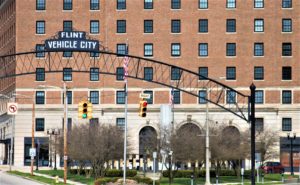By Linda Pohly
On June 1, 2020, in the wake of the George Floyd murder and during the early days of the COVID -19 pandemic, the city council and mayor of Flint adopted a joint resolution declaring that racism is a public health crisis and setting out a plan for addressing the crisis as a city. The joint resolution described the marked disparities in the economic and health impacts of the pandemic on communities of color. It stated:
“(T)he City is committed … to prioritize racial equity in our decision making processes, to acknowledge that communities of color have borne the burdens of inequitable social, environmental, economic, and criminal justice policies practices and investments, to understand that the legacy of these inequitable policies has caused deep disparities, harm, and mistrust, and to recognize that racial equity is realized when and only when race can no longer be used to predict life outcomes.”
The joint resolution states that as a matter of City policy, the Council and Mayor would “do all things necessary promote equity through all policies approved by the Flint City Council…”

Black Lives Matter Flint protesters marching downtown Flint in June 2020. (Photo by Tom Travis)
The City of Flint is challenged economically and at the time of the joint resolution there were not sufficient funds in its treasury to implement the joint resolution and to strive for racial equity.
But that changed nearly a year ago in March 2021 , when Congress enacted and the President signed the American Rescue Plan Act (ARPA) which addresses the impact the pandemic had on the people of this nation.
Flint received an ARPA award of $94.7 million which may be spent to accomplish the goals stated in the Joint Resolution. Now, the City has the funds to demonstrate that those words reflected the true beliefs and intention of the Mayor and Council, and were not empty words reflecting a politically expedient response to a national crisis.

The office of the city’s Finance department at City Hall. (Photo by Tom Travis)
The federal government determined awards for metropolitan cities such as Flint with a formula that considers the population of a city, but 70%, or over $66 million of our award, was determined by criteria which include relative poverty of the residents….
Of the highest significance for the residents of our City and its future, ARPA permits use of the granted funds to respond to the negative public health and economic impacts of the pandemic.
The federal government established broad criteria for the use of ARPA funds. The pertinent parts of ARPA provide for grants to municipalities and other governmental entities for four authorized uses:
- To respond to the public health emergency or its negative economic impacts, including assistance to households, small businesses, and nonprofits, or aid to impacted industries such as tourism, travel, and hospitality;
- To respond to workers performing essential work during the COVID–19 public health emergency by providing premium pay to eligible workers;
- For the provision of government services to the extent of the reduction in revenue due to the COVID–19 public health emergency relative to revenues collected in the most recent full fiscal year prior to the emergency; and
- To make necessary investments in water, sewer, or broadband infrastructure.

Genesee County Health Department nurse prepares Moderna COVID vaccine injections at Our Lady of Guadalupe Church on Flint’s north end. (Photo by Tom Travis)
A local government may transfer funds to a private nonprofit organizations, a public benefit corporation involved in the transportation of passengers or cargo, or a special purpose unit of state or local government. The rule provides that this is not an exclusive list, but any transferee is bound by the same reporting responsibilities and restrictions on the use of the funds.
The numbers now reflect a narrowing of the disparities, although the demographic data reflecting ethnicity has also declined, which might disguise the continuing effects of the pandemic on communities of color. Far too often, and in far too many places, a person’s safety from COVID-19 is directly related to their race, ethnicity, economic status, social status and neighborhood.
One of the major goals of ARPA is to alleviate and/or address the disproportionate impact of the pandemic on communities of color and other low income communities. In the early days of the pandemic, COVID-19 cases, hospitalizations, and deaths in communities of color considerably exceeded their respective proportions of the population in the United States and in Michigan.
In response, the regulation implementing ARPA encourages spending of the funds on disproportionately impacted communities, such as low income communities and people of color, and provides that the City may provide services and programs for those communities without requiring a direct connection to the economic or health impacts of the pandemic.

As a result the City of Flint may offer enhanced services which will improve the quality of life of the residents of our highly impacted neighborhoods such as blight remediation, mental health services, community benefit navigators, remediation of lead hazards, evidence-based community violence intervention programs, food assistance, rent, mortgage, utility assistance, housing repair programs and cash assistance.
Properly implemented, these needed services have the potential to change the living conditions and the trajectory of the lives of thousands of our residents.
Flint has a long tragic and history of structural racism that continues to determine the quality of the lives of our residents. Major examples of the impact of systemic racism in the last 50 years alone include residential and educational segregation, the destruction of the St. John Street neighborhood to make room for a freeway, and most recently the Flint water crisis.
Enforced racial segregation, restrictive covenants and redlining may now be illegal, but the economic and social effects continue to this day. These funds might be our last and best chance to address our history and to change our future as a community.
Flint received a disproportionally high award through ARPA funding because of the equitable emphasis reflected in the formula for calculation of ARPA grant amounts. The federal government determined awards for metropolitan cities such as Flint with a formula that considers the population of a city, but 70%, or over $66 million of our award, was determined by criteria which include relative poverty of the residents, the number of people in poverty, population growth lag and the state of our housing stock.

A vehicle city arch in downtown Flint. The historic Durant Hotel in the background. (Photo by Tom Travis)
Flint received the second largest ARPA award in the state after Detroit, even though it is only the twelfth largest governmental unit in Michigan. Our award is even higher than that of Grand Rapids. Flint received such a high award because of widespread poverty in our community.
Nearly 39% of the residents in our city live below the federal poverty line, compared to a nationwide poverty rate of 12.3%. The misery of so many of our residents resulted in significantly more funds awarded to our city to address these inequities.
Any policy that does not direct the majority of this new funding toward addressing racial and economic inequities would divert the funds away from their intended purpose and be contrary to the City of Flint’s stated policy, the stated policy of the federal government in determining our award, and fundamental fairness for our residents who account for the disproportionally large size of the award.
To achieve the goals stated in the joint resolution, the City should explicitly affirm the policy of racial equity established by the Mayor and City Council in the joint resolution. It should first evaluate every proposed use of the funds to determine whether it advances the goal of racial equity.

The city council has debated the allocation of the ARPA funds since 2021. (Photo by Tom Travis)
Especially in our city, equity and equality are incompatible goals. A goal or standard of equality in distribution of the funds would further entrench health and economic disparities. For example allocating funds equally to improve both heavily impacted and stable neighborhoods would result in relatively greater improvement to the stable neighborhoods as there is less to remedy, further entrenching disparities.
A goal of advancing racial equity would require that the neighborhoods already struggling with blight, population loss, disproportionate unemployment, or unavailability of healthy food sources receive more more funding for the services that will have the greatest impact on the most challenged communities.
The City of Flint can not address the needs of the residents unless it makes an intentional, organized and extensive effort to engage the residents in identification of those needs. The city government has only recently begun to meet with residents to gather information on the needs of the community. These meetings should continue, and many more should be scheduled at different times of day so all may attend.
Addressing the needs identified by the residents, especially those in heavily impacted communities, and developing our plan to meet those needs, is probably the most critical step toward equity for all of our residents.
Other municipalities have embraced ARPA’s goals of equity and inclusion and have tailored their programs to meet their particular needs. Detroit’s plan specifically includes racial equity as a goal, and features blight reduction, neighborhood improvements, and programs such as funding improvement for private homes with a goal of building generational wealth.

For example, St. Louis provides for cash payments to impacted families and implements strategies to address the root causes of crime and to build better public health infrastructure. Baltimore has allocated over $50 million to programs designed to prevent violence.
Boston, which has many more available resources than Flint, places a heavy emphasis on promoting equitable outcomes with programs for prevention of foreclosure, food access, housing, child care and fare-free bus service. These plans were developed after extensive engagement with the community and with an explicit goal of improving racial equity, as were dozens of others across the country.
An explicit policy with a goal of significantly reducing racial disparities in our city would benefit the city and all of its residents. Flint will not progress when a significant percentage of its residents struggle with blighted neighborhoods, economic hardship, poor health services and poor access to training and education.
Racial inequities burden everyone, because of the need to devote significant resources by government and the community as a whole to the literal survival of large parts of our community, reducing the resources available for us to grow and recover as a City. Persistent inequities deprive our community of the benefit of all the talents of all of our neighbors and make us an unattractive prospect for economic development.
Finally, and perhaps most importantly, our city’s focus of these newly available funds on racial and economic equity will be moral and just. The funds should be spent where they are most needed and according to the priorities already stated by the City Council and Mayor in the joint resolution, not where they are most popular or most politically expedient. It is simply the right thing to do.
Public input sessions planned
The City of Flint will be holding public input meetings on the following dates: tomorrow, Feb 17 from 6 to 7:30 p.m. at Mott Community College in the Mott Event Center.
Three other public input sessions are planned by the City of Flint to be held from 6 p.m. to 7:30 p.m. on the following dates:
-
Tuesday, Feb. 22: Sylvester Broome Empowerment Village
-
Thursday, March 3: Accelerated Learning Academy (formerly Scott School)
-
Tuesday, March 8: Insight Institute of Neurosurgery & Neuroscience (IINN)
The Flint City Council also will host public input sessions with dates and times yet to be announced.
EVM guest opinion columnist Linda Pohly is a lawyer who lives in Flint. She is a member of the Greater Flint Coronavirus Taskforce on Racial Inequities, all of the opinions she expresses are her own.


You must be logged in to post a comment.